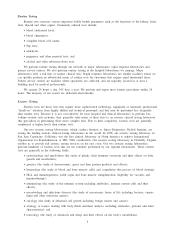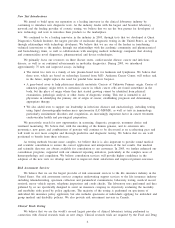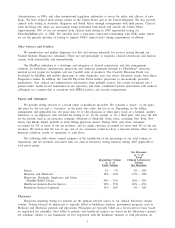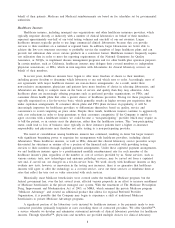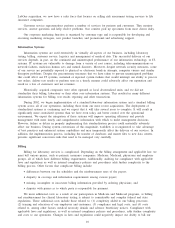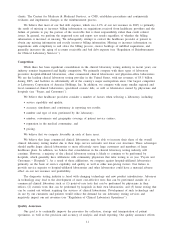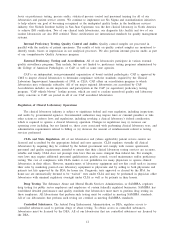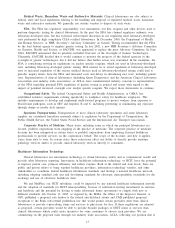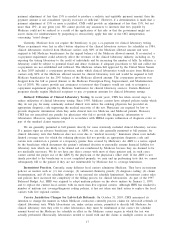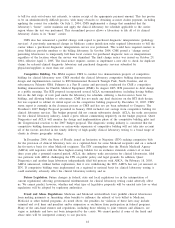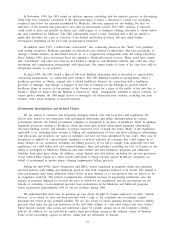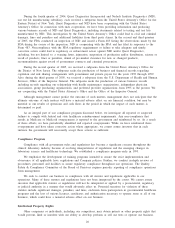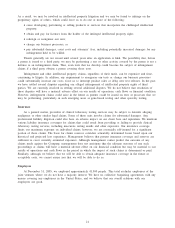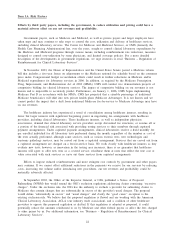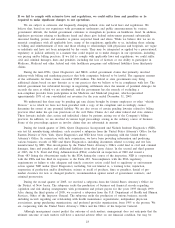Quest Diagnostics 2005 Annual Report Download - page 30
Download and view the complete annual report
Please find page 30 of the 2005 Quest Diagnostics annual report below. You can navigate through the pages in the report by either clicking on the pages listed below, or by using the keyword search tool below to find specific information within the annual report.Medical Waste, Hazardous Waste and Radioactive Materials. Clinical laboratories are also subject to
federal, state and local regulations relating to the handling and disposal of regulated medical waste, hazardous
waste and radioactive materials. We generally use outside vendors to dispose of such waste.
FDA. The FDA has regulatory responsibility over instruments, test kits, reagents and other devices used to
perform diagnostic testing by clinical laboratories. In the past, the FDA has claimed regulatory authority over
laboratory-developed tests, but has exercised enforcement discretion in not regulating most laboratory-developed
tests performed by high complexity CLIA-certified laboratories. In December 2000, the Department of Health
and Human Services, or HHS, Secretary’s Advisory Committee on Genetic Testing recommended that the FDA
be the lead federal agency to regulate genetic testing. In late 2002, a new HHS Secretary’s Advisory Committee
on Genetics, Health and Society, or SACGHS, was appointed to replace the prior Advisory Committee. In June
2004, SACGHS announced that its priorities included Overview of the Oversight of Genetic Technologies.
Ultimately, SACGHS decided that it would continue to monitor the progress of the federal agencies in the
oversight of genetic technologies, but it did not believe that further action was warranted. In the meantime, the
FDA is considering revising its regulations on analyte specific reagents, which are used in laboratory-developed
tests, including laboratory-developed genetic testing. FDA interest in or actual regulation of laboratory-developed
tests or increased regulation of the various medical devices used in laboratory-developed testing could lead to
periodic inquiry letters from the FDA and increased costs and delays in introducing new tests, including genetic
tests. Representatives of clinical laboratories (including Quest Diagnostics) and the American Clinical Laboratory
Association (our industry trade association), or ACLA, have communicated industry concerns to representatives
of the FDA regarding potential FDA regulation of genetic testing in general and issues with regard to the
impact of potential increased oversight over analyte specific reagents. We expect those discussions to continue.
Occupational Safety. The federal Occupational Safety and Health Administration, or OSHA, has
established extensive requirements relating specifically to workplace safety for healthcare employers. This
includes requirements to develop and implement multi-faceted programs to protect workers from exposure to
blood-borne pathogens, such as HIV and hepatitis B and C, including preventing or minimizing any exposure
through sharps or needle stick injuries.
Specimen Transportation. Transportation of most clinical laboratory specimens and some laboratory
supplies are considered hazardous materials subject to regulation by the Department of Transportation, the
Public Health Service, the United States Postal Service and the International Air Transport Association.
Corporate Practice of Medicine. Many states, including some in which our principal laboratories are
located, prohibit corporations from engaging in the practice of medicine. The corporate practice of medicine
doctrine has been interpreted in certain states to prohibit corporations from employing licensed healthcare
professionals to provide services on the corporation’s behalf. The scope of the doctrine, and how it applies,
varies from state to state. In certain states these restrictions affect our ability to directly provide anatomic
pathology services and/or to provide clinical laboratory services directly to consumers.
Healthcare Information Technology
Clinical laboratories use information technology to obtain laboratory orders and to communicate results and
provide other laboratory reporting. Innovations in healthcare information technology, or HCIT, have the potential
to improve patient care, promote efficiency and reduce expense. Both at the federal and state levels, there are
public and private efforts to bring together healthcare providers, information technology vendors, and other
stakeholders to coordinate federal healthcare information standards and develop a national healthcare network,
including adopting standard code sets and developing standards for electronic interoperability (standards for the
exchange and use of electronic healthcare data).
We and MedPlus, our HCIT subsidiary, could be impacted by any national healthcare information network
and the adoption of standards for HCIT interoperability, because of substantial existing investments in software
and hardware and the potential for having to make substantial future investments to comply with new or
different standards. On October 11, 2005, as required by the MMA, the Office of the Inspector General, or
OIG, published a proposed safe harbor to the federal anti-kickback statute and CMS published proposed
exceptions to the Stark self-referral prohibition law that would permit certain providers other than clinical
laboratories to provide e-prescribing items and services to physicians for free. If these regulations are adopted
as proposed, certain providers would be able to provide broader packages of HCIT items or services than
clinical laboratories which could create incentives for some customers to choose such providers. We are
commenting on the proposed rules through our industry trade association, ACLA, reflecting our position that if
13




